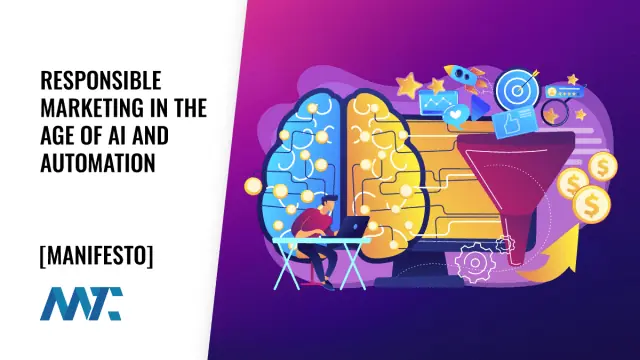Artificial intelligence (AI), data, and automation increasingly drive marketing strategies; we must establish a framework for responsible marketing practices as marketing professionals. While there are tools that can be used for consumers and businesses to defend against the onslaught of autonomous, personalized, and targeted communications that are coming… irresponsible marketers will still have destructive potential with minimal investment that can deluge potential and current customers.
As marketers, I feel strongly that we must also agree on bridging the gap between potential and current customers who want brands to speak to their needs and the companies who can leverage and deploy technologies that can exploit technology to drive questionable sales.
As technology advances, we must ensure that our marketing efforts prioritize consumers’ well-being and interests while maintaining ethical standards. This manifesto outlines the fundamental principles that should guide responsible marketing in a world shaped by AI and automation.
Transparency and Informed Consent: Marketers must be transparent about their data collection practices and obtain informed consent from consumers. This includes communicating what data is being collected, how it will be used, and with whom it will be shared. Consumers should have the right to opt out of data collection and the ability to access and manage their personal information easily.
Data Privacy and Security: Protecting consumer data should be a top priority for marketers. Robust data privacy and security measures must be implemented to safeguard personal information from unauthorized access, breaches, and misuse. Marketers should adhere to industry best practices and comply with relevant data protection regulations, such as the General Data Protection Regulation (GDPR) and the California Consumer Privacy Act (CCPA).
Ethical AI and Automation: Ensuring technologies are developed and deployed ethically is essential when utilizing AI and automation in marketing. Marketers must be vigilant in preventing AI systems from perpetuating biases, discrimination, or manipulation. AI algorithms should be regularly audited for fairness and transparency, and marketers should be held accountable for any unintended consequences resulting from AI and automation.
Respect for Consumer Autonomy: Marketers must respect consumers’ autonomy and their right to make informed decisions. AI and automation should be used to empower consumers, not to manipulate or deceive them. Marketers should avoid using dark patterns, hidden costs, or other deceptive tactics that undermine consumer choice and control.
Responsible Personalization: While personalization can enhance the consumer experience, it must be done responsibly. Marketers should strike a balance between providing relevant content and respecting consumer privacy. Personalization should be based on explicit consent and should not be used to exploit vulnerable individuals or sensitive personal information.
Accountability and Ethical Oversight: Marketers must be held accountable for their actions and the impact of their marketing practices on consumers and society as a whole. Industry associations and regulatory bodies should establish ethical guidelines and oversight mechanisms to ensure compliance with responsible marketing principles. Marketers should also foster a culture of ethical decision-making within their organizations and provide training on responsible marketing practices.
Social Responsibility: Responsible marketing extends beyond consumer protection and encompasses social responsibility, ethical sourcing, and sustainability. Marketers should use their influence to promote positive social change, support their communities, and address global challenges. This includes aligning marketing strategies with organizations that share common goals and advocating for responsible consumption and production practices.
As marketing professionals, we have a duty to uphold the principles of responsible marketing in the age of AI and automation. By prioritizing transparency, data privacy, ethical AI, consumer autonomy, responsible personalization, accountability, and social responsibility, we can build consumer trust and contribute to a more sustainable and equitable future. Our collective responsibility is to ensure that the power of technology is harnessed for the benefit of both consumers and society as a whole.
©2024 DK New Media, LLC, All rights reserved.
Originally Published on Martech Zone: A Manifesto for Responsible Marketing in the Age of AI and Automation

